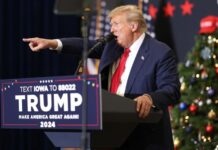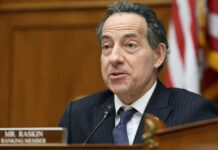 Late last week, the bipartisan No Labels group announced the abandonment of its effort to field an independent “unity ticket” in the 2024 presidential race.
Late last week, the bipartisan No Labels group announced the abandonment of its effort to field an independent “unity ticket” in the 2024 presidential race.
The announcement was met with celebration and smirks among the Democratic Party faithful, relative silence from most Republicans, except for sighs of relief from the party’s “Never Trump” wing, and an increased focus on the stand-alone presidential campaign of Robert F. Kennedy Jr. and his newfound running mate and financier, Nicole Shanahan.
No Labels’ claimed justification for a third-party effort is valid. According to the latest Harvard/Harris poll, 61% of American voters are dissatisfied with the upcoming Biden-Trump rematch and believe that the nation “needs another choice.” In addition, there was something appealing to the prospect of a centrist, unity ticket that focused more on common sense political solutions than confrontational party politics to excite voters in charting a new path forward.
No Labels made significant progress in raising money to pursue its efforts, in qualifying its promised ballot in states across the country and in attracting a lot of attention for an effort that, even if not successful, would likely affect the outcome of an anticipated close race between Biden and Trump. In that regard, common wisdom projected that a No Labels ticket would draw more significantly from disenchanted Democratic voters and likely hand victory to former President Donald Trump.
Although that analysis may have been correct, we will never know. No Labels was not able to find a candidate with a “credible path to winning the White House.” And so, in the words of No Labels’ founder and CEO Nancy Jacobson, “the responsible course of action for us is to stand down.”
Over the past several months, speculation centered on the likely No Labels “unity ticket” of centrist personalities who would be nominated. That list grew as more “centrists” withdrew from their campaigns for president or announced their retirement from Congress. But No Labels was not able to recruit a top-tiered candidate to lead the ticket. And so, the effort failed.
As a practical matter, America’s two-party system and electoral college process make it difficult for a third-party candidate to prevail in a presidential election. While winning a plurality in most elections will almost always result in victory, a presidential election requires a majority of electoral college votes or the election is thrown to Congress, where the two-party members decide the winner.
On top of that, several people on the No Labels nomination list still have higher aspirations within their political parties and were not willing to risk losing that party affiliation by running on a third-party ticket.
That doesn’t mean No Labels is going away. Jacobson promises that the group will continue to pursue common sense, bipartisan solutions to ongoing political issues that divide the country. But No Labels’ withdrawal from the presidential sweepstakes puts a sharper focus on the independent campaign of Kennedy and Shanahan and the consequences of their remaining third-party challenge. They can’t win. But some of the same disaffection that propelled No Labels may help them affect the result.






